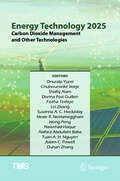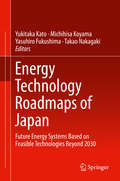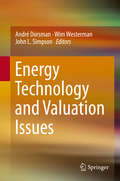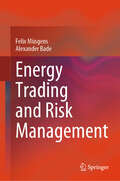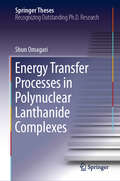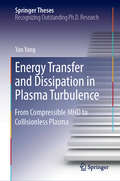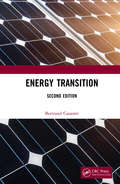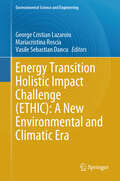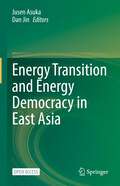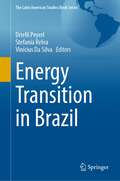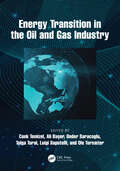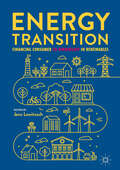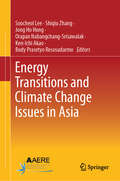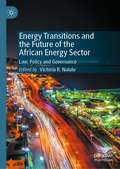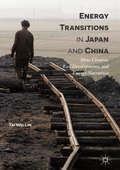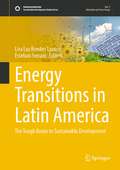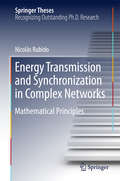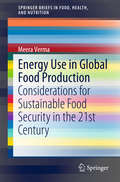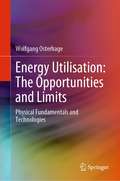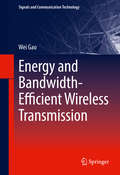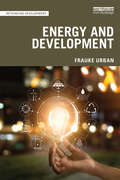- Table View
- List View
Energy Technology 2025: Carbon Dioxide Management and Other Technologies (The Minerals, Metals & Materials Series)
by Lei Zhang Neale R. Neelameggham Nawshad Haque Donna Post Guillen Shafiq Alam Onuralp Yücel Fiseha Tesfaye Alafara Abdullahi Baba Adam C. Powell Hong Peng Susanna A. C. Hockaday Chukwunwike Iloeje Tuan A. H. Nguyen Duhan ZhangThis collection is focused on industrial energy sustainability and CO2 management, including processes that improve energy efficiency and reduce or eliminate industrial GHG emissions. Topics address technology areas such as clean energy technologies, innovative beneficiation, smelting technologies, process intensification, as well as CO2 capture and conversion for industrial applications. Areas of interest include but are not limited to: Energy and materials-efficient minerals extraction and processing, including waste heat recovery, materials recycling, and other methodologies for low-cost energy materials production Advances in design and optimization of renewable and low-carbon energy harvesting technologies and energy carriers, including theory, new technology concepts, simulations and demonstrations relevant to decarbonizing materials extraction and processing Systems assessment for sustainable materials processing, including techno-economic, life cycle, circularity, technology scale-up, and regulatory impacts Low carbon technologies for advanced materials conversion, including carbon and other GHG reduction metallurgy in ferrous, nonferrous, and reactive metals capture and mineralization, carbon upgrade to chemicals, and use of low carbon fuel and feedstock Advances in materials for energy and carbon mitigation, such as infrared reflecting, endothermic and carbon absorbing materials for applications such as urban heat island mitigation and space cooling
Energy Technology Innovation
by Arnulf Grubler Charlie WilsonEnergy technology innovation - improving how we produce and use energy - is critical for a transition towards sustainability. This book presents a rich set of twenty case studies of energy technology innovation embedded within a unifying conceptual framework. It provides insights into why some innovation efforts have been more successful than others, and draws important policy conclusions. The case studies cover a wide range of energy technologies, ranging from energy supply to energy end use, from successes to failures and from industrialized, emerging and developing economies. The case studies are presented by an international group of eminent scholars under the auspices of the Global Energy Assessment (GEA), whose main volume was published in 2012 by Cambridge University Press. Energy Technology Innovation presents new data, new concepts and novel analytical and policy perspectives. It will prove to be invaluable for researchers, policy makers, economists, industrial innovators and entrepreneurs in the field of energy technology.
Energy Technology Roadmaps of Japan
by Yukitaka Kato Michihisa Koyama Yasuhiro Fukushima Takao NakagakiThis book, edited by members of the Committee of Future Energy and Social Systems, The Society of Chemical Engineers, Japan, describes energy technology roadmaps for Japan post-Fukushima. In this work, energy technology experts show quantitatively the advantages and disadvantages of major energy technologies with which they are involved, in a unified chapter structure with figures illustrating the technology development perspectives. The future energy vision for Japan together with the pathway is quantitatively discussed, explicitly considering the contributions of individual energy technology by referring to the technology roadmaps. The pathways for future energy vision thus derived will be useful not only for all energy researchers but also for graduate students in the field to grasp the potential of the technologies and future energy system of Japan.
Energy Technology and Valuation Issues
by André Dorsman Wim Westerman John L. SimpsonThis volume investigates the impact of energy technology innovations on economic development and presents new areas of research into the financial economics of energy as well as new studies into valuation, electricity pricing and the economic, regulatory and environmental costs of alternative energy sources. Academics and practitioners take a global perspective and present cases from several countries. The book concentrates on three issues: 1) innovation and shocks in energy markets; 2) environment and renewables and 3) fossil fuel regulation. The book will provide a useful resource for anyone with an academic or business interest in energy and value issues. This is the fourth volume in a series on energy organized by the Center for Energy and Value Issues (CEVI). The previous volumes in the series include Financial Aspects in Energy (2011), Energy Economics and Financial Markets (2012) and Perspectives on Energy Risk (2014).
Energy Trading And Investing: Trading, Risk Management, And Structuring Deals In The Energy Market
by Davis W. EdwardsPower-up your investment portfolio Volatile energy prices and a rapidly changing energy industry provide investment opportunities for savvy investors and dangers for uninformed ones. Natural gas fracking has the raised the concern that the world may be awash in cheap oil and natural gas. A decade of record high temperatures has replaced concerns about shrinking fossil fuel supplies. Alternative energy technologies like batteries, solar, and wind are shaking up utilities. Constant innovation and changing markets remains the hallmark of the energy sector. Written by a leading expert in the energy sector, Energy Trading and Investing, Second Edition covers this exciting market discussing topics that range from traditional and emerging markets to need-to-know financial principles and proven investing strategies. A longstanding veteran of Wall Street trading and the energy sector, Davis Edwards provides detailed information on every topic important to energy investors, including: • Natural gas, electricity, petroleum, coal, weather, and emissions markets • Details on financial products, like futures, forwards, swaps, and options • Deal structuring examples explaining spread options, spatial load forecasting, and tolling agreements • Coverage of specialty electricity markets - capacity, financial transmission rights (FTRs), power purchase agreements (PPAs), and ancillary services • Explanations of natural gas transportation, storage, and swing option contracts • A practical introduction to market risk, credit risk, and model risk management. This hands-on guidebook covers topics for professional traders, individual investors, MBA students, and energy market participants. Jargon from both the financial industry and energy market is fully explained and the math is made accessible to the average reader. Regardless of your background, Energy Trading and Investing will provide you with a comprehensive understanding of energy trading. If you’re a serious trader, you need to understand the energy markets, and Energy Trading and Investing is the only book you need to trade successfully in this vibrant sector.
Energy Trading and Risk Management
by Felix Müsgens Alexander BadeThis book offers important insights into the intricacies of energy trading and risk management to students and professionals in the liberalized electricity and natural gas markets. In its opening chapter, the book delves into fundamental concepts, including price formation on wholesale markets. The various market places and trading products are presented, and the distinguishing characteristics of electricity and natural gas compared to other commodities are emphasised. Moving forward, the next chapter concentrates on portfolio management, offering insights into the trading process through the perspectives of various agents. It begins with proprietary traders and progresses to encompass the portfolio management activities of integrated companies responsible for both generation assets and a retail client base. The book then looks at risk management, explaining the diverse risks that impact the value of energy portfolios inthe market. It places emphasis on credit risk, price risk, quantity risk, and product liquidity risk as the most influential factors and presents effective practices for their management. Furthermore, readers will gain a comprehensive understanding of how to manage quantity risk and its interconnectedness with price risk. Additionally, the book addresses the measurement of product liquidity and its disparities across different energy market products. In summary, this book is an accessible introduction and a concise reference for students and professionals across all fields of energy.
Energy Transfer Processes in Polynuclear Lanthanide Complexes (Springer Theses)
by Shun OmagariThis book describes the luminescence mechanism of polynuclear lanthanide complexes, focusing on energy transfer processes using a combination of experimental and theoretical approaches. Lanthanide complexes show intense luminescence from the lanthanide ion through sensitization by the organic ligands. The high chromaticity of the emission and the long lifetimes of the complexes are particularly attractive for applications such as organic light-emitting diodes and bioprobes. Polynuclear lanthanide complexes (coordination polymers and clusters) have attracted considerable interest for functionalization by energy transfer between lanthanide ions. At the same time, such extra processes complicate the luminescence mechanism, hindering the rational design of functional polynuclear lanthanide complexes. Firstly, the book explains the principle of the theoretical methods, and then describes the concentration-quenching mechanism in coordination polymers. It also examines the effect of intrinsic spin–orbit coupling arising from lanthanide ions on the ligand-to-lanthanide energy transfer efficiency and the mechanism of back energy transfer (the opposite of sensitizing energy transfer) in lanthanide clusters. This sets the stage for the final topic: the suppression of back energy transfer by energy transfer between lanthanide ions in lanthanide clusters, which is of critical importance, showing that the lanthanide clusters can be considered a new generation of functional and efficient luminescent material and could also provide a breakthrough in lanthanide photophysics.
Energy Transfer and Dissipation in Plasma Turbulence: From Compressible MHD to Collisionless Plasma (Springer Theses)
by Yan YangThis book revisits the long-standing puzzle of cross-scale energy transfer and dissipation in plasma turbulence and introduces new perspectives based on both magnetohydrodynamic (MHD) and Vlasov models. The classical energy cascade scenario is key in explaining the heating of corona and solar wind. By employing a high-resolution hybrid (compact finite difference & WENO) scheme, the book studies the features of compressible MHD cascade in detail, for example, in order to approximate a real plasma cascade as “Kolmogorov-like” and to understand features that go beyond the usual simplified theories based on incompressible models. When approaching kinetic scales where plasma effects must be considered, it uses an elementary analysis of the Vlasov–Maxwell equations to help identify the channels through which energy transfer must be dissipated. In addition, it shows that the pressure–strain interaction is of great significance in producing internal energy. This analysis, in contrast to many other recent studies, does not make assumptions about wave-modes, instability or other specific mechanisms responsible for the dynamics – the results are direct consequences of the Vlasov–Maxwell system of equations. This is an important step toward understanding dissipation in turbulent collisionless plasma in space and astrophysics.
Energy Transfers (Energy Essentials)
by Nigel Saunders Steven ChapmanThis children's book focuses on: Types of Energy, Storing Energy, Chemical Energy, Fossil Fuels, Nuclear Energy, Losing Energy, Electricity, and Sound Energy.
Energy Transition
by Bertrand CassoretThis book presents both the importance of energy transition and its associated difficulties. Energy Transition, Second Edition, provides an explanation of the physical concepts of energy and power and also reviews global energy consumption and our dependence on energy. The book discusses the links between the economy and energy. It explains the drawbacks and dangers of different energy sources and tries to compare them. By reviewing future energy resources, it evaluates several transition scenarios. The book shows that the laws of physics prevent the emergence of simple, pleasant solutions, but it proposes potential solutions and encourages readers to develop better processes from energy sources to production to consumption. This book will be of interest to engineers and undergraduate and graduate students studying and working in various fields of energy; producers of fossil, gas, oil, coal, electric, renewable, and nuclear energy; and anyone interested in better understanding these fundamental problems for our future. FEATURES Discusses the current issues with energy transition Covers several energy transition scenarios and their associated difficulties Presents the links between economy and energy Highlights the importance of a global discussion of energy Encourages the development of better, improved processes in energy sources from production to consumption
Energy Transition Holistic Impact Challenge (Environmental Science and Engineering)
by George Cristian Lazaroiu Mariacristina Roscia Vasile Sebastian DancuThis book states that the new environmental challenge will also have to be faced ethically, science can provide the tools, but people will have to be sensitized so that they make their own environmental ethics. The challenge of the new era is: the environment and therefore the climate, as it does not start outside of us, but as a constituent element of our life and therefore lived ethically. The new vision proposed in this book is to push technology together with the human being, in assuming environmentally ethical behaviors: this is the greatest collective action of humanity. Sustainable development has allowed an integrated key to the social, economic, and environmental dimensions. Through ethics, sustainability can be combined not only by referring to the problem of pollution and the exploitation of natural resources, but it creates a new global era that includes all dimensions of people's lives and of society. The shared and structured environmental ethics allow an approach that is no longer short-term but provide the collective tools to look far in time. With this book, we want to lay the instrumental, technical, social, and legislative foundations, to provide a new methodology for the care of the environment, as up to now, there has been much discussion, but little achieved in a truly ethical way.
Energy Transition and Energy Democracy in East Asia
by Jusen Asuka Dan JinThis is an open access book.The subject of this book is to provide down-to-earth information on what kind of actions are being taken by the Government, Local community, Businesses, Researchers, NGOs on the energy transition in this region. It gives an updated picture of the energy transition in the East Asian countries, where the economic growth, as well as CO2 emission growth, is significant.This book focuses not only on the technological perspective of the energy transition but also on the relationship between democracy and energy transition. Readers of this book can understand what kind of international support and pressure is needed to promote the energy transition in this region.Since energy transition is needed not only for combatting climate change but also for the Green Recovery from the COVID-19 pandemic, publishing this book is very helpful to promote the Green Recovery and the Green New Deal world-widely.
Energy Transition in Brazil (The Latin American Studies Book Series)
by Drielli Peyerl Stefania Relva Vinícius Da SilvaThe book's objective is to present the energy transition process in Brazil over time and offer new perspectives on this process in the eyes of a sustainable future. The book unfolds over 15 chapters covering historical, geopolitical, technological, and economical aspects, as well as aspects conceptually familiar to the energy transition such as public perception, low-carbon technologies, digitalization, Sustainable Development Goals, and even recent topics such as the pandemic of COVID-19. The Brazilian electricity and transport sectors and climate change governance are the main focus of this book. The paths taken throughout this book demonstrate the particularities of Brazil and present this country in a unique and differentiated way in terms of the various approaches to the energy transition. It is a book that brings a multidisciplinary, innovative vision and information published for the first time.
Energy Transition in the Oil and Gas Industry
by Luigi Saputelli Cenk Temizel Ole Torsæter Ali Başer Onder Saracoglu Tolga TuralThe oil and gas industry is in the midst of a paradigm shift, moving from developing solely petroleum-based energy to producing alternative energy forms, including renewables. Energy Transition in the Oil and Gas Industry offers a comprehensive overview of renewables and their applications in the oil and gas industry during the current energy transition period. It includes the latest methods and workflows in renewables and oil and gas processes as well as integrated and hybrid approaches currently used as the industry begins its transition to the production of alternative forms of energy. Provides a synopsis of fossil fuel resources, along with the latest technologies, applications, and economics, and offers a general outline for the energy transition Details various alternative and renewable energy forms and discusses their advantages, disadvantages, maturity levels, and applications, including solar, geothermal, wind, hydropower, fuel cells, hydrogen, biofuels, ocean energy, and nuclear Discusses carbon capture and storage, electric vehicles, and energy storage technologies Covers the latest advances and technologies related to digital transformation in the oil and gas industry Summarizes future trends and directions of technologies related to renewable energy and energy transition in the oil and gas industry Addressing energy holistically from a technology and engineering perspective, this book offers engineering professionals in the energy sector a wide-ranging view of current and near future changes taking place in this critical industry.
Energy Transition: Financing Consumer Co-Ownership in Renewables
by Jens LowitzschConsumer (co-)ownership in renewable energy (RE) is essential to the overall success of Energy Transition. In June 2018, the European Union agreed on a corresponding enabling framework as part of a recast of the Renewable Energy Directive (RED II). The transposition of these comprehensive rules – in particular those on local RE communities – requires developing, implementing and rolling out business models that broaden the capital participation of consumers. The challenge is to include municipalities and/or commercial investors like SMEs and advance to economies of scale while retaining the benefits of individual consumer participation.This book is addressed to energy consumers in local communities, their municipalities and to the policy makers who represent them. Additionally, non-EU countries, in particular those where rural areas have limited access to energy, e.g. in Asia, Africa and Latin America, may be interested in the benefits of consumer ownership. While demand for energy in developing countries is growing, access to energy is crucial for improving the quality of life. The editor of this book presents a new model of consumer ownership in RE for both the EU and countries worldwide. Part One describes the rationale for consumer ownership in RE with regard to social, organizational, legal and financial conditions. Part Two discusses the issue of financing RE and introduces a new financing technique, the Consumer Stock Ownership Plan (CSOP), comparing it to traditional models. Part Three provides 18 country studies from Europe, North America, South America and Asia, organized so as to enable a cross-country comparison of policy approaches and feasibility. Policy recommendations are based on the results of this survey. Part Four summarizes, compares the best practice cases, presents a cost-benefit analysis of “prosumage” and against this background evaluates the impact on future policy.
Energy Transitions and Climate Change Issues in Asia
by Soocheol Lee Ken-Ichi Akao Budy Prasetyo Resosudarmo Shiqiu Zhang Jong Ho Hong Orapan Nabangchang-SrisawalakThe rapid pace of economic development and urbanization in Asia have led to several major problems such as greenhouse gas emissions, mass consumption, and depletion of natural resources. These problems pose a major threat to a sustainable future for Asia and are hindering many Asian countries' goal of becoming carbon-neutral by the middle of this century. Solving these problems requires a comprehensive understanding of the nature of energy consumption, exploitation of natural resources, and deterioration of the environment.To accelerate the green energy transition and promote efficient resource use in Asia, a range of policy options and joint efforts among Asian countries will be required, including carbon pricing, resource tax reform, the expansion of transition finance, support for the development of low-carbon, and resource-efficient social infrastructure. However, Asia is home to many countries, each in a different stage of economic development and with its own culture and customs. Practical implementation of these policies will require bringing together researchers, policymakers, and citizens to share their knowledge and engage in discussions to generate policy ideas that are appropriate for each country. The purpose of this book is to share theoretical and empirical knowledge and convey policy implications that can be expected to accelerate energy transition and resource use effectiveness toward a sustainable future in Asia.
Energy Transitions and the Future of the African Energy Sector: Law, Policy and Governance
by Victoria R. NaluleThis book explores current developments in the African energy sector and highlights how these are likely to be affected by the ongoing global efforts to transition to a low-carbon economy. It analyses the legal, regulatory and policy frameworks at the national and regional level as they relate to Energy transition in Africa and discusses how regionalism is increasingly utilized to tackle energy access and climate change challenges. Using case studies from across the continent, several key thematic issues, including gender justice, social license to operate, local content and conflict of energy laws are covered in detail. The authors also uniquely examine the progressive nature of global energy use and introduce the new concept of ‘Energy Progression.’ This book will be an invaluable reference for researchers and policymakers looking for a comprehensive overview of the field.
Energy Transitions in Japan and China
by Tai Wei LimThis volume focuses on the topic of energy transitions in the coal mining industries of China and Japan by adopting a Sino-Japanese comparative approach in area studies to examine the experiences between the two major East Asian economies. In China, rapid industrialization led to dramatic growth in energy demand and much of this energy demand was fueled by affordable coal energy. With growing social concerns about the environment and an increasingly vocal middle class in contemporary China, the authorities and state-owned enterprises are studying the use of coal fuels for its future development. In Japan, coal was also an affordable main source of energy for Japan's early post-war heavy industrialization until it was gradually replaced by oil in the 1960s. The oil shocks of the 1970s compelled Japan to look for cleaner and cheaper fuels, including nuclear power. In these energy transitions from coal to oil and then onto non-fossil fuels, the story of coal power in both countries is highlighted in this publication as a comparative study. This volume is a crucial contribution to the discussion of China's energy reforms, and required reading for scholars of climate change and society.
Energy Transitions in Latin America: The Tough Route to Sustainable Development (Sustainable Development Goals Series)
by Lira Luz Benites Lazaro Esteban SerraniThis book comprehensively analyzes the challenges and opportunities associated with transitioning to sustainable energy systems in Latin America. Recognizing that energy transition goes beyond mere changes in energy systems, it is also essential to address the imperative of ensuring a just transition and equitable benefits for all, particularly for vulnerable populations. This recognition emphasizes prioritizing social equity and inclusivity throughout the energy transition process. By adopting a critical perspective grounded in multidisciplinary approaches from the social sciences, the book delves into the complex energy transition issues, exploring the broader social, economic, and political dimensions involved. The book is divided into four parts. Part I highlights the changing energy mix in Latin America and the geopolitical implications of the increasing reliance on renewable sources. Part II examines the dilemmas faced by countries that rely on oil and gas revenues and the obstacles they face in transitioning to a low-carbon economy. Part III analyzes the production, technology, and costs as limits and opportunities for energy transition and adoption of renewable energies. Finally, part IV explores energy access and the democratization of energy generation in Latin America, including efforts to address energy poverty, the growth of distributed energy, and prosumers. Energy Transitions in Latin America: The Tough Route to Sustainable Development is a valuable resource that will benefit researchers in energy studies and policymakers alike. It serves as a comprehensive guide for those seeking to navigate the complexities of energy transitions. It is an essential source for fostering informed decision-making and driving sustainable development in the region.
Energy Transmission and Synchronization in Complex Networks
by Nicolás RubidoThis work tackles the problems of understanding how energy is transmitted and distributed in power-grids as well as in determining how robust this transmission and distribution is when modifications to the grid or power occur. The most important outcome is the derivation of explicit relationships between the structure of the grid, the optimal transmission and distribution of energy, and the grid's collective behavior (namely, the synchronous generation of power). These relationships are extremely relevant for the design of resilient power-grid models. To allow the reader to apply these results to other complex systems, the thesis includes a review of relevant aspects of network theory, spectral theory, and novel analytical calculations to predict the existence and stability of periodic collective behavior in complex networks of phase oscillators, which constitute a paradigmatic model for many complex systems.
Energy Use in Global Food Production
by Meera VermaThis Brief examines the sustainability of energy use in global food production and processing. The nexus between food, water, and energy are explored against a background of climate change. Current efforts to reduce the energy intensity of food and increase sustainability are explored. Food waste and its impact on energy is covered, including regional variations and nutrient recycling methods. Energy Use in Global Food Production uses case studies to illustrate how food production and processing is a significant contributor to anthropogenic climate change. Modern industrial agriculture uses fossil fuel to grow crops and produce fertilizers, pesticides and farm machinery. Additional energy is used to transport and process food at a primary and secondary level. With the median forecast for global population at more than 9 billion by 2030, a 30% increase over the current population, energy efficient food processing will be of increasing importance. This Brief provides an overview of current energy efficient food processing methods looks at the way forward as demands continue to increase.
Energy Utilisation: Physical Fundamentals and Technologies
by Wolfgang OsterhageThis textbook introduces energy utilisation. It outlines energy balances - which are determined by the fundamental laws of thermodynamics-, the fundamentals of atomic and nuclear mechanisms, the laws of fluid mechanics and electromagnetism. The technologies which stem from these mechanisms, including steam power plants, solar and wind energy systems, hydrodynamic power, biomass and geothermal energy systems, are all discussed. Prospects for future projects, such as nuclear fusion, fuel cells, and smart energy concepts are presented, as well as the role of energy balances in relation to climate engineering. Opportunities and Limits of Energy Utilisation will be of interest to graduate students, as well as researchers, lecturers, industry engineers. It provides numerous examples, problems and solutions, making it particularly relevant to students looking for a thorough understanding of the fundamentals of advanced energy technologies.
Energy and Bandwidth-Efficient Wireless Transmission
by Wei GaoThis book introduces key modulation and predistortion techniques for approaching power and spectrum-efficient transmission for wireless communication systems. The book presents a combination of theoretical principles, practical implementations, and actual tests. It focuses on power and spectrally efficient modulation and transmission techniques in the portable wireless communication systems, and introduces currently developed and designed RF transceivers in the latest wireless markets. Most materials, design examples, and design strategies used are based on the author's two decades of work in the digital communication fields, especially in the areas of the digital modulations, demodulations, digital signal processing, and linearization of power amplifiers. The applications of these practical products and equipment cover the satellite communications on earth station systems, microwave communication systems, 2G GSM and 3G WCDMA mobile communication systems, and 802. 11 WLAN systems. >
Energy and Conflict: The Life and Times of Edward Teller
by Stanley Blumberg Gwinn OwensHere is the first biography of Edward Teller, based on exclusive access to the man and the archives. This is the life story of perhaps the most controverisal and certainly one of the greatest nuclear physicists of the twentieth century. widely known as the father of the hydrogen bomb, Teller was a genius among giants in the scientific community, his career coterminus with the nuclear age. His controversy with Robert Oppenheimer, here updated, constitutes one of the dramatic high points of the Cold War, in which Teller has been an absolutely crucial figure.
Energy and Development (Rethinking Development)
by Frauke UrbanThis book explores the complex relationship between energy and development and discusses the core issues and concepts surrounding this growing area of research and policy. In the field of energy and development, the world faces two major challenges: (1) Providing energy access to the roughly one billion people worldwide who do not have access to electricity and the nearly three billion people worldwide who do not have access to clean cooking fuels; (2) achieving socioeconomic development while limiting global atmospheric temperature increases to 2 degrees Celsius to mitigate climate change. Taking stock of progress, Frauke Urban explores the key issues surrounding these goals and addresses the policy responses aimed at ending energy poverty and achieving sustainable development. She outlines various options for delivering energy access, analyses past and prospective energy transitions and examines the social, environmental, economic and technological implications of these possibilities. Taking a holistic and multi-disciplinary approach and containing useful teaching resources, Energy and Development provides a comprehensive overview of this complex field of study. This book will be a great resource for postgraduate and undergraduate students, scholars, practitioners and policymakers working in the fields of energy studies, international development, environmental studies, industrial engineering, as well as social sciences that relate to energy and development.
